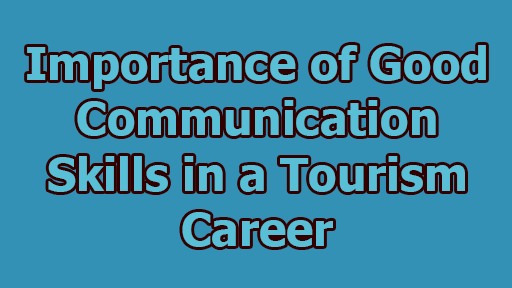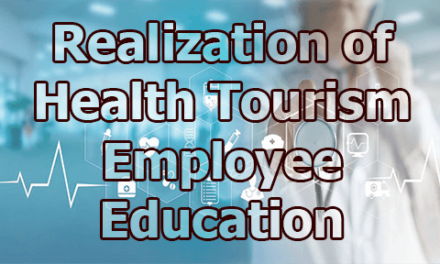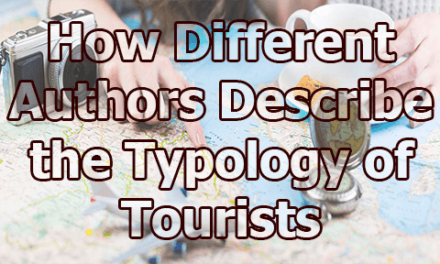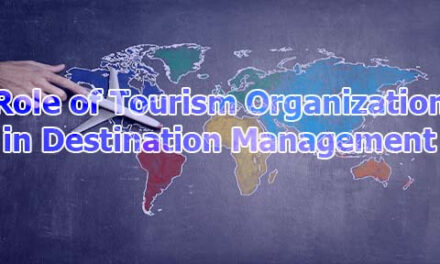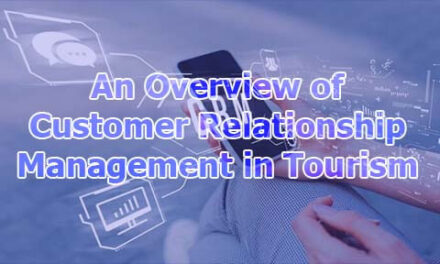Importance of Good Communication Skills in a Tourism Career:
The field of tourism is a multifaceted and dynamic industry that involves interactions with a diverse range of people. As a tourism professional, whether you work in hospitality, travel agencies, tour guiding, or any other related sector, your ability to effectively communicate with a wide array of individuals is of paramount importance. Good communication skills are not just a desirable quality for a tourism personnel; they are an essential tool for success. In this article, we will explore the importance of good communication skills in a tourism career through relevant examples.
Section 1: Understanding the Tourism Industry:
To appreciate the importance of good communication skills in the tourism industry, it is essential to first understand the nature and scope of this sector. The tourism industry encompasses a broad range of activities and services, including but not limited to:
- Hospitality: This includes hotels, restaurants, resorts, and other accommodations.
- Travel Agencies: These businesses provide travel planning, ticketing, and reservation services.
- Tour Guiding: Tour guides lead groups of tourists, providing information and guidance.
- Transportation: This involves airlines, cruise lines, and other transportation services.
- Entertainment and Attractions: Tourists visit various attractions and engage in recreational activities.
- Event Management: Tourism often involves organizing and managing events such as conferences, conventions, and festivals.
- Eco-tourism: Focusing on nature-based and sustainable tourism.
The tourism industry is characterized by its direct interaction with customers and clients, many of whom have diverse backgrounds, languages, and cultural expectations. To succeed in this industry, a tourism professional needs to be an effective communicator, as good communication underpins various aspects of their job.
Section 2: The Role of Communication in the Tourism Industry:
Effective communication plays a crucial role in various facets of the tourism industry. Let’s examine some of these areas in brief and provide examples to illustrate their significance.
2.1 Customer Service: Customer service is at the heart of the tourism industry. From the moment a guest checks in at a hotel to the time they explore a new destination with a tour guide, every interaction can shape the customer’s experience. Good communication skills are vital in this context as they directly impact customer satisfaction.
Example: Imagine a scenario where a guest at a hotel encounters an issue with their room, such as a malfunctioning air conditioner. A well-trained hotel staff member with strong communication skills will be able to empathetically listen to the guest’s concerns, convey understanding, and effectively communicate the steps being taken to resolve the issue. This not only ensures the guest’s comfort but also leaves a positive impression, potentially leading to repeat business and positive reviews.
2.2 Sales and Marketing: Tourism professionals often need to market their services to attract tourists. Effective marketing and sales strategies rely on the ability to communicate the value of the offerings to potential customers.
Example: A travel agency promoting a tour package to a cultural heritage site must have skilled communicators who can craft persuasive and informative advertisements. They should be able to convey the historical significance and unique experiences of the destination in a way that appeals to the target audience. Effective communication in marketing and sales can lead to increased bookings and revenue.
2.3 Cross-Cultural Communication: The global nature of the tourism industry means that professionals regularly interact with people from various cultural backgrounds. Understanding and respecting cultural differences and preferences are essential to providing a positive experience for all tourists.
Example: A tour guide leading a group of international tourists in a culturally rich city must have cultural sensitivity and the ability to communicate effectively with people from different countries. Being able to explain local customs and history in a way that respects the tourists’ cultural backgrounds not only enhances their experience but also avoids potential misunderstandings or offense.
2.4 Crisis Management: In the tourism industry, unexpected crises can occur, such as natural disasters, accidents, or public health emergencies. Communicating efficiently and effectively in these situations is crucial for ensuring the safety and well-being of tourists.
Example: Consider a scenario where a sudden storm disrupts a group’s outdoor excursion. A tour guide with strong communication skills can calmly and clearly convey safety instructions and alternative plans to the group. This not only ensures the tourists’ safety but also builds trust and confidence in the tour operator’s ability to handle unforeseen situations.
2.5 Collaboration: Tourism professionals often work in teams, and effective communication is essential for teamwork and collaboration.
Example: In a hotel, various departments such as housekeeping, front desk, and maintenance need to coordinate to ensure smooth operations. Good communication among team members ensures that tasks are executed efficiently and that the guest experience remains seamless.
Section 3: Specific Communication Skills for Tourism Professionals:
The tourism industry demands a broad spectrum of communication skills. Tourism professionals should be adept at various forms of communication, including verbal, written, and non-verbal communication. Here are some specific communication skills that are essential for success in this field:
3.1 Verbal Communication:
- Active Listening: Tourism personnel need to listen attentively to customer concerns, questions, and feedback. This helps in understanding their needs and addressing them effectively.
- Effective Speaking: The ability to convey information clearly, concisely, and with enthusiasm is crucial, especially for tour guides and customer service representatives.
- Language Skills: Multilingualism is an asset in the tourism industry. Being able to communicate in multiple languages can significantly enhance the tourist experience.
3.2 Written Communication:
- Email Communication: Written communication skills are essential for responding to customer inquiries, sending confirmations, and handling reservations.
- Content Creation: Professionals involved in marketing and promotion should be skilled at creating engaging and persuasive written content, such as blog posts, brochures, and advertisements.
3.3 Non-Verbal Communication:
- Body Language: Tourism professionals should be aware of their own body language and be able to interpret the body language of customers to gauge their comfort and satisfaction.
- Facial Expressions: A warm and welcoming facial expression can set a positive tone for customer interactions.
- Gestures: In some cultures, gestures can convey specific meanings. Understanding cultural differences in gestures is crucial to avoid misunderstandings.
Section 4: The Impact of Good Communication Skills on Career Advancement:
The benefits of good communication skills in the tourism industry extend to career advancement and personal development. Let’s explore how effective communication can impact your career in this field.
4.1 Improved Customer Satisfaction: Tourism personnel with strong communication skills are more likely to provide excellent customer service, leading to increased customer satisfaction. Satisfied customers are more likely to return and recommend your services to others, which can enhance your professional reputation and career prospects.
Example: A tour guide who consistently receives positive reviews and feedback for their engaging and informative presentations is more likely to be considered for leadership roles within their tour company.
4.2 Enhanced Networking: Networking is a valuable aspect of career growth in the tourism industry. Effective communication allows you to build strong professional relationships, whether it’s with colleagues, suppliers, or industry partners. These connections can lead to opportunities for collaboration and career advancement.
Example: A hotel manager who communicates effectively with other local businesses and organizations may find opportunities for cross-promotion and joint ventures, which can boost the hotel’s revenue and their own career.
4.3 Leadership and Supervision: As you progress in your tourism career, you may find yourself in leadership or supervisory roles. Effective communication is a fundamental skill for managing teams, delegating tasks, and ensuring that the operation runs smoothly.
Example: A restaurant manager needs to communicate clearly with kitchen staff, waitstaff, and customers to ensure a seamless dining experience. Strong leadership and communication skills are essential for maintaining a high standard of service.
4.4 Crisis Management: In times of crisis, effective communication can be the difference between a successful resolution and a potentially damaging situation. Professionals who can manage crises calmly and communicate clearly gain the trust of both customers and employers.
Example: A travel agency manager who handles a situation involving flight cancellations and rebooking with poise and effective communication can salvage the situation, maintaining the trust of affected customers and minimizing financial losses for the agency.
4.5 Adaptability and Innovation: The tourism industry is constantly evolving, and professionals need to adapt to changing circumstances and embrace innovation. Effective communication skills enable you to convey new ideas and strategies to your team and clients.
Example: A tour operator who can effectively communicate the benefits of incorporating eco-friendly practices into their tours can tap into the growing market of eco-conscious travelers, enhancing the company’s competitiveness and their own career prospects.
Section 5: Challenges in Communication for Tourism Professionals:
While good communication skills are vital for success in the tourism industry, professionals in this field face unique challenges that can hinder effective communication. It’s essential to be aware of these challenges and learn how to navigate them.
5.1 Language Barriers: In a global industry, language barriers are common. Tourism personnel often interact with customers who speak different languages or have limited proficiency in the local language. Overcoming language barriers requires patience and adaptability.
Example: A receptionist at an international hotel may encounter guests who speak limited English. In such cases, using simple language, gestures, and visual aids can help convey essential information and ensure a smooth check-in process.
5.2 Cultural Differences: Cultural differences can lead to misunderstandings and miscommunications. What may be considered polite or appropriate in one culture may be perceived differently in another. It’s crucial to be culturally sensitive and adaptable.
Example: A tour guide leading a group of tourists from diverse cultural backgrounds should be aware of cultural taboos and customs. For instance, some cultures may find certain hand gestures offensive, so the guide must avoid using them.
5.3 High-Stress Situations: The tourism industry can be high-pressure, especially during peak seasons or when dealing with unexpected issues like flight delays or lost luggage. Effective communication under stress is a valuable skill.
Example: An airport customer service representative must remain composed and communicate effectively when dealing with frustrated passengers during a flight delay. Calmly explaining the situation and offering solutions can help defuse tensions.
5.4 Diverse Customer Expectations: Tourists have diverse expectations and preferences. Some may desire a high level of personal interaction and assistance, while others prefer minimal engagement. Tourism personnel must adapt their communication styles to meet these varying needs.
Example: A concierge at a luxury hotel may provide extensive information and assistance to a guest seeking recommendations for dining and activities, while another guest may prefer a more discreet and efficient service.
5.5 Technological Communication: The advent of technology has transformed the way tourism professionals communicate with customers. Online reviews, social media, and email are now crucial communication channels, and tourism personnel must adapt to these new platforms.
Example: A hotel’s online reputation can be heavily influenced by guest reviews. Effective communication with guests during their stay and promptly addressing any issues can lead to positive reviews and repeat bookings.
Section 6: Improving Communication Skills in the Tourism Industry:
The importance of good communication skills in the tourism industry is clear, but how can professionals in this field enhance their communication abilities? Here are some practical strategies for improving communication skills:
6.1 Training and Education:
- Language Training: If you work in a location with a diverse range of tourists, consider learning key phrases in multiple languages to better assist guests.
- Customer Service Training: Participate in customer service workshops to learn techniques for handling customer inquiries, complaints, and feedback effectively.
- Cultural Sensitivity Workshops: Develop cultural competence by attending workshops or courses that teach you about different cultures and how to interact respectfully with people from diverse backgrounds.
6.2 Practice and Role-Playing: Engage in regular practice and role-playing exercises to sharpen your communication skills. This can be done individually or as part of team training. These activities can help you adapt to different communication styles and scenarios.
6.3 Feedback and Self-Assessment: Request feedback from colleagues and supervisors to identify areas for improvement in your communication skills. Self-assessment and reflection are also essential for recognizing your strengths and weaknesses.
6.4 Cross-Training: Cross-training in different departments within your organization can provide you with a broader understanding of the industry and enhance your ability to communicate effectively with colleagues from various backgrounds.
6.5 Keep Up with Industry Trends: Stay informed about current trends and technological advancements in the tourism industry, especially those related to communication. Embrace new tools and platforms for communication, such as social media and mobile apps, to engage with customers.
6.6 Conflict Resolution Training: Conflict is inevitable in the tourism industry. Learning conflict resolution techniques can help you address disputes effectively while maintaining a positive customer experience.
6.7 Emotional Intelligence: Develop your emotional intelligence, which involves recognizing and managing your own emotions and empathizing with others. This skill is crucial for understanding and responding to customers’ emotional needs.
In conclusion, in the world of tourism, good communication skills are not just an asset; they are a fundamental requirement for success. Effective communication influences every aspect of the tourism industry, from customer service and marketing to crisis management and leadership.
Tourism professionals who master the art of communication can expect to enjoy numerous benefits in their careers, including improved customer satisfaction, enhanced networking opportunities, and the ability to navigate challenges in this dynamic industry.
As the tourism industry continues to evolve, professionals who prioritize and continually develop their communication skills will be better positioned to thrive and contribute to the growth and success of their organizations. Good communication is not just a tool for success in the tourism industry; it is the foundation upon which exceptional experiences are built for travelers worldwide.
References:
- Airey, D. (2010). Tourism in the city: Towards an integrative agenda on urban tourism. Journal of Travel Research, 0047287510362776.
- Dávila, A., & Fayos-Solà, E. (2018). Tourism management in warm-water island destinations. CABI.
- Go, F. M. (2017). Tourism in the city: Towards an integrative agenda on urban tourism. Pergamon.
- Hall, C. M., & Page, S. J. (2014). Tourism and regional development: New pathways. Routledge.
- Hudson, S., & Riley, M. (2020). Tourism and COVID-19: Impacts and implications for advancing and resetting industry and research. Journal of Travel Research, 0047287520943731.
- Jamal, T. (2007). Tourism and the social sciences: An introduction. Channel View Publications.
- Ritchie, J. R. B., & Crouch, G. I. (2003). The competitive destination: A sustainable tourism perspective. CABI.
- Ryan, C. (2009). Recapturing the spirit of hospitality: Communication in the multicultural tourism workplace. Tourism Management, 30(6), 950-961.
- Sigala, M. (2017). Collaborative commerce in tourism: Implications for research and industry. Current Issues in Tourism, 20(12), 1288-1302.
- Urry, J. (2011). The tourist gaze 3.0. Sage Publications.

Library Lecturer at Nurul Amin Degree College

